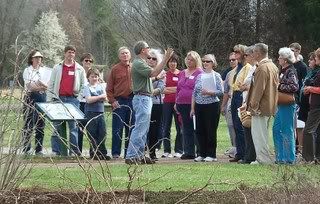Using soil tests will help garden grow
Saturday, March 14, 2009
Huntsville Times
Q: I am hoping that you can help me with my gardening problems. I have a small 15 x 20 vegetable garden, which I started two years ago with limited success. I would like to have my soil tested. Is there a place I can have my soil tested? In addition, the soil is very high in clay content. Should I add some compost and wood chips into the soil and continue adding horse manure (depending on the results of the soil test)? Thank you. - David M.
A: For me, all discussions about success in a vegetable garden begin and end with your soil. Having a rich, fertile, well-drained soil is critical and our predominant red clay soils leave much to be desired when it comes to growing a productive garden.
I would strongly encourage you to get a soil test - while it will not be necessary to do this every year, you need to have a starting point from which to work. There are several tests that need to be done, and one could say they are similar to getting your cholesterol levels or your blood pressure checked. You need to know where you are before you start making changes
Now, having this test done accomplishes several things. The first is giving you a pH value, also known as the potential of the hydrogen ion. There's lots of chemistry involved, and for gardeners it is important in that plants have certain ranges they like to grow in and many essential nutrients are only available at certain numbers.
Most soils around here are between 5.0 and 7.0. Soils with values below 7.0 are considered acidic, while those above 7.0 are basic or alkaline.
Most garden vegetables like a pH of 6.2 to 6.8. If your pH is below that, you may need to add lime and your test will recommend how much to apply. If your soil happens to be above 7.0 then you will need to apply sulphur to lower the pH.
With time our soils tend to become more acidic since the calcium ions are either used up by plants or leached out of the soil by rainfall. As calcium leaves, it is replaced by hydrogen thus lowering the pH.
The second test that is very important entails the amount of phosphorus in the soil. Phosphorus is a primary nutrient that plants need to grow. However, unlike nitrogen, phosphorus tends to stay put so over time our soils have built up high levels of this nutrient and it is not necessary to apply. While excess phosphorus will not harm plants, it may limit the uptake of iron and zinc, both nutrients needed for plant growth.
They will also tell you what type of soil you have (I am going to tell you it is red clay) and the percent of organic matter. This will be less than 5 percent, and I know that you will need to add more to really make your garden grow.
Things to do:
Add snapdragons, calendulas, kale or nasturtiums for early spring color in the garden.
Apply pre-emergent herbicide for crabgrass control this summer. Crabgrass germinates at 50 degree F soil temperature. Pre-emergent products with fertilizer should not be used on Bermuda or Zoysia grass at this time.
E-mail Harvey Cotten at harvey.cotten@htimes.com, or write to Harvey Cotten c/o The Huntsville Times, P.O. Box 1487 West Station, Huntsville 35807.


